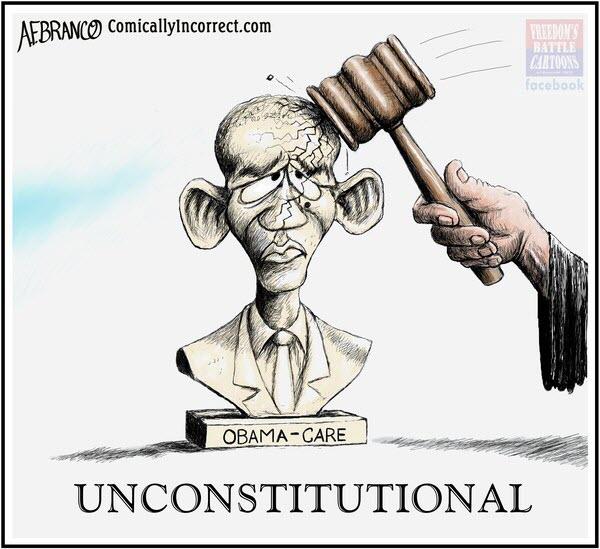The Trump-Barr Department of Justice (DOJ) informed a federal appeals court on Monday that it agrees with Texas and the other states suing over Obamacare that President Donald Trump’s repealing of the individual mandate renders the entire law unconstitutional, and therefore should be struck down in its entirety.
This all turns on the legal doctrine of severability. Much of the time when a statute is unconstitutional it is actually only partially unconstitutional. Typically a court will strike down that part of the law, but sever it from the rest of the statute and uphold the remainder.
Pundits who have never studied or litigated severability will surely show up on television now posing as experts, and criticizing DOJ’s position. But writing as a former law school faculty member who authored the largest academic work on severability doctrine ever published, permit me to describe the argument and why it should be taken seriously.
President Barack Obama signed the Affordable Care Act (ACA) in 2010 when a Democrat-controlled Congress passed that statute without a single Republican vote in either the House or Senate. Various plaintiffs immediately filed suit. In the biggest lawsuit, a majority of states in the nation – along with the National Federation of Independent Businesses (NFIB) and several private individuals – filed suit in Florida, arguing that the ACA was unconstitutional.
The plaintiffs raised multiple constitutional issues. At the heart of the legal challenge is the doctrine of enumerated powers: The Constitution gives the federal government only limited powers, and so every provision of every law Congress passes must be authorized by one of the provisions of Article I, Section 8 of the Constitution.
One constitutional objection to the ACA was that Section 1501 of the ACA – which is the individual mandate that requires Americans to buy health insurance – is unconstitutional, because Congress’s constitutional power to regulate interstate commerce in Article I, Section 8, Clause 3 of the Constitution does not include the power to order human beings to buy something, thereby entering into the commercial realm where the government can regulate them.
Section 1201 of the ACA is the preexisting condition provisions of “guaranteed issue” and “community rating,” which ensures that no person attempting to purchase insurance can be denied coverage, and that a person cannot be charged more because of preexisting conditions. Section 1501 mandates that everyone buy insurance to offset the effect of the multi-billion-dollar costs arising from Section 1201.
Another count of the lawsuit brought by the states and NFIB was that the individual mandate section could not be severed from the other 450 sections of the 1,000-page ACA statute, and therefore that the whole statute must fail with the mandate section.
NORAD Launches US Fighter Jets as Russian Military Aircraft Enter American Air Defense Identification Zone
Virginia Dems mandate Jan. 6 be taught as ‘violent insurrection,’ ban election fraud claims in schools
Trump Turns Up Heat on Republicans, Pressures Them to Pass SAVE Act: ‘Country Defining Fight for the Soul of Our Nation!’
Pentagon policy chief grilled as Dem claims Trump broke promise about going to war with Iran
Georgia sheriff arrested on DUI charge after blood alcohol content was allegedly almost triple legal limit
Small plane crashes into Phoenix home minutes after takeoff, injuring 3
‘Third-party’ auditor investigating Minnesota fraud received millions in state Medicaid funds
Macron vows nuclear arsenal boost as Europe turns to nukes amid rising global threats
‘Under siege’: Inside the growing radical Islam threat critics say is hiding in plain sight in deep red Texas
Walz-Ellison administration ‘enabled’ Minnesota’s fraud scandal: Guy Benson
NYC Dept of Education employee arrested, charged with murder of Bronx father
Savannah Guthrie returns to ‘Today’ show studio for first time since mother went missing
Iran widens regional war with first strike into Azerbaijan
5 House Oversight Committee Republicans Join with Democrats to Subpoena Pam Bondi in Epstein Probe
As Jasmine Crockett Concedes Texas Senate Primary, Attention Focuses on Radical Dem Who Beat Her
Judge Roger Vinson of the U.S. District Court for the Northern District of Florida agreed, holding it was unconstitutional. Vinson also held that the individual mandate could not be severed from the remainder of the statute, and therefore struck down the ACA in its entirety. (Disclosure: Vinson quoted this author’s legal brief in the case when he ruled that the individual mandate is nonseverable.)
The U.S. Court of Appeals for the Eleventh Circuit agreed that the individual mandate was unconstitutional, and noted that even the Obama DOJ admitted to the court that Section 1501 could not be severed from the statute, but nonetheless severed that section anyway, and upheld the rest of the law.
The Supreme Court in 2012 took the historic case of NFIB v. Sebelius to decide four issues: (1) whether a different federal statute – the Anti-Injunction Act – even permitted federal courts to decide this case before the individual mandate went into effect in 2014; (2) whether the individual mandate is not authorized by Congress’s authority under Article I, Section 8; (3) whether the ACA’s enormous expansion of Medicaid unconstitutionally coerces the states; and (4) whether the statute can be severed from any sections that are unconstitutional.
The justices unanimously agreed that it had jurisdiction to decide the case immediately. By a 7-2 decision, the Court agreed that the Medicaid expansion was unconstitutional under the Tenth Amendment, but a separate 5-4 lineup held that the expansion would be constitutional if it was optional for the states, and effectively rewrote Section 2001 of the ACA.
Four justices – conservatives Antonin Scalia, Clarence Thomas, and Samuel Alito, joined by moderate Anthony Kennedy – wrote that the individual mandate exceeded Congress’s Commerce Clause power and was therefore unconstitutional. They also wrote that the Medicaid expansion exceeded Congress’s Spending Clause power, and could not be rewritten, and thus those core provisions must both be struck down.
Justices Scalia, Kennedy, Thomas, and Alito also wrote that both the individual mandate and the Medicaid expansion were critical to the entire ACA. They concluded that the provisions could not be severed from the statute, and that without either one, all of Obamacare must go down.
Breitbart News published a five-part series on “The Great Dissent,” quoting the justices in their own words, explaining through those five articles their reasoning that (1) Obamacare must be struck down, (2) the individual mandate violates the Commerce Clause, (3) the individual mandate is not a tax, (4) the Medicaid expansion violates the Tenth Amendment, and (5) both unconstitutional provisions are nonseverable from the ACA, and so the entire law must be struck down.
Then came a historic surprise. Chief Justice John Roberts agreed that the individual mandate was not authorized by the Constitution’s Commerce Clause. However, he concluded that even though only a couple paragraphs in 980 pages of legal briefs discussing Congress’s power to tax, and even though only a couple minutes was spent on that issue during six hours of oral argument, that the individual mandate was authorized by the Constitution’s Tax Clause, and was therefore constitutional.
Roberts admitted that the individual mandate looked like a commercial regulatory law, and thus would normally need to be authorized by the Commerce Clause. However, he wrote that there were several factors that, taken together, permitted courts to view the mandate as a tax. These included that (1) it was codified in 26 U.S.C. § 5000A, which is part of the Tax Code; (2) it was enforced by the IRS, (3) proof of complying with the mandate is reported along with a person’s annual Form 1040 tax return, and (4) failure to comply results in a tax penalty that goes to the U.S. Treasury along with normal tax money.
NORAD Launches US Fighter Jets as Russian Military Aircraft Enter American Air Defense Identification Zone
Virginia Dems mandate Jan. 6 be taught as ‘violent insurrection,’ ban election fraud claims in schools
Trump Turns Up Heat on Republicans, Pressures Them to Pass SAVE Act: ‘Country Defining Fight for the Soul of Our Nation!’
Pentagon policy chief grilled as Dem claims Trump broke promise about going to war with Iran
Georgia sheriff arrested on DUI charge after blood alcohol content was allegedly almost triple legal limit
Small plane crashes into Phoenix home minutes after takeoff, injuring 3
‘Third-party’ auditor investigating Minnesota fraud received millions in state Medicaid funds
Macron vows nuclear arsenal boost as Europe turns to nukes amid rising global threats
‘Under siege’: Inside the growing radical Islam threat critics say is hiding in plain sight in deep red Texas
Walz-Ellison administration ‘enabled’ Minnesota’s fraud scandal: Guy Benson
NYC Dept of Education employee arrested, charged with murder of Bronx father
Savannah Guthrie returns to ‘Today’ show studio for first time since mother went missing
Iran widens regional war with first strike into Azerbaijan
5 House Oversight Committee Republicans Join with Democrats to Subpoena Pam Bondi in Epstein Probe
As Jasmine Crockett Concedes Texas Senate Primary, Attention Focuses on Radical Dem Who Beat Her
Years later, President Trump signed the Tax Cuts and Jobs Act of 2017. Part of that historic tax reform repealed 26 U.S.C. § 5000A in the Tax Code, which is the operative part of the individual mandate.
Texas Attorney General Ken Paxton immediately sued, joined by 19 other states. Their argument is that the factors Roberts relied upon to uphold the individual mandate as a tax no longer existed. As such, the only relevant constitutional provision is the Commerce Clause, and a five-Justice majority already held in NFIB that the individual mandate would be unconstitutional if it relied upon Congress’s commercial regulatory power.
Texas went on to argue that the individual mandate still cannot be severed from the rest of the ACA, and therefore the entire statute must be struck down.
Consider Congress’s findings on the role the individual mandate plays in the entire Obamacare system. Those official findings are found in Section 1501 itself, and those findings from Section 1501(a) were permanently codified in the United States Code in 42 U.S.C. § 18091(a).
Congress said at 42 U.S.C. § 18091(a)(2)(A) that without the individual mandate, “some individuals would make an economic and financial decision to forego health insurance,” and thus would endanger the whole Obamacare system. Paragraph 18091(a)(2)(C) says that “together with other provisions of this Act,” the individual mandate is what will add people to the insurance market. Paragraph 18091(a)(2)(D) says the individual mandate will result in “near-universal coverage.”
Paragraph 18091(a)(2)(H) adds:
The [individual mandate] requirement is an essential part of this larger regulation of economic activity, and the absence of the requirement would undercut Federal regulation of the health insurance market.
And finally, Paragraph 18091(a)(2)(I) adds that:
… if there were no [individual mandate], many individuals would wait to purchase health insurance until they needed care. By significantly increasing health insurance coverage, the requirement, together with the other provisions of the Act, will minimize adverse selection and broaden the health insurance risk pool to include healthy individuals, which will lower health insurance premiums. The requirement is essential to creating effective health insurance markets …..
The Obama administration admitted during the big Supreme Court case that the individual mandate was the essential “linchpin” to keep the entire ACA from imploding due to unsustainable costs. It is a compelling argument against severability.
The Supreme Court has held that courts must look to congressional intent when determining whether part of a statute can be severed to salvage the rest. Courts must ascertain the original “legislative bargain,” and then ask two questions: First, does the remaining statute “function in a manner consistent with the intent of Congress.” And if so, second, would Congress “have enacted them standing alone and without the unconstitutional portion.”
NORAD Launches US Fighter Jets as Russian Military Aircraft Enter American Air Defense Identification Zone
Virginia Dems mandate Jan. 6 be taught as ‘violent insurrection,’ ban election fraud claims in schools
Trump Turns Up Heat on Republicans, Pressures Them to Pass SAVE Act: ‘Country Defining Fight for the Soul of Our Nation!’
Pentagon policy chief grilled as Dem claims Trump broke promise about going to war with Iran
Georgia sheriff arrested on DUI charge after blood alcohol content was allegedly almost triple legal limit
Small plane crashes into Phoenix home minutes after takeoff, injuring 3
‘Third-party’ auditor investigating Minnesota fraud received millions in state Medicaid funds
Macron vows nuclear arsenal boost as Europe turns to nukes amid rising global threats
‘Under siege’: Inside the growing radical Islam threat critics say is hiding in plain sight in deep red Texas
Walz-Ellison administration ‘enabled’ Minnesota’s fraud scandal: Guy Benson
NYC Dept of Education employee arrested, charged with murder of Bronx father
Savannah Guthrie returns to ‘Today’ show studio for first time since mother went missing
Iran widens regional war with first strike into Azerbaijan
5 House Oversight Committee Republicans Join with Democrats to Subpoena Pam Bondi in Epstein Probe
As Jasmine Crockett Concedes Texas Senate Primary, Attention Focuses on Radical Dem Who Beat Her
If the answer to either question is “no,” then the unconstitutional provision is nonseverable, and the court must strike down the entire statute.
Paxton’s team representing the 20 states – initially led in the courtroom by Texas Solicitor General Scott Keller and now continued by Keller’s successor, Kyle Hawkins – set forth all this material to Judge Reed O’Connor of the U.S. District Court for the Northern District of Texas.
The defenders of the ACA argued that when Congress amended the Tax Code through President Trump’s new law, that reset the clock as to the point in time a court should look at for legislative intent. They say that a court should ask if Congress meant to repeal the whole Obamacare system when it enacted the Trump tax cuts. If not, they say the individual mandate can now be severed.
But the states’ counterargument is that Congress removed the part of the mandate that was a tax, but did not remove the congressional findings that the individual mandate was still essential to the ACA being able to function as Congress wishes.
Judge O’Connor accepted Paxton’s arguments. The district court held that without taxing power support, the individual mandate is an unconstitutional mandate under the Commerce Clause, and that the rest of the ACA cannot be severed from it.
The case is now on appeal before the U.S. Court of Appeals for the Fifth Circuit. The head of DOJ’s Civil Division, Assistant Attorney General Jody Hunt, filed a notice with the Fifth Circuit on Monday informing the court that the Trump administration agrees with Texas that the individual mandate is unconstitutional and nonseverable, and thus that the entire ACA is unconstitutional. DOJ therefore will be filing briefs in support of the legal challenge. (Liberal states have intervened as the defendants in the case.)
What so many talking heads derided as an absurd lawsuit suddenly looks like a pretty serious case after all.
President Trump has had a major impact on the Fifth Circuit through his judicial appointments. Proven constitutional conservatives like Judges Don Willett, Jim Ho, Andy Oldham, and Kyle Duncan now sit on that court, under the mentoring of the fearless originalist Edith Jones and the libertarian-leaning Jerry Smith.
Regardless of how the Fifth Circuit rules in the case, the fact remains that the fifth vote to win at the Supreme Court is still Roberts. Many believe that his reasoning was such a stretch to save Obamacare the first time that he would find another rationale to do so now.
While that might be true, it does not need to be true. It is possible that the chief justice could play it straight from his 2012 reasoning, in which case the ACA should be struck down without the tax authorization.
It is also possible that President Trump will fill another Supreme Court vacancy before this case is decided by the Supreme Court – a decision that could come in 2020 but is more likely to come in 2021 – in which case Roberts’ vote might not even be necessary.
Suddenly, Obamacare is back in the legal crosshairs. If it falls under this legal challenge, President Trump would have a clean canvas on which to design fundamental market-based reforms to provide healthcare security and freedom for millions of Americans.
The case is Texas v. United States, No. 19-10011 in the U.S. Court of Appeals for the Fifth Circuit.
Story cited here.
























